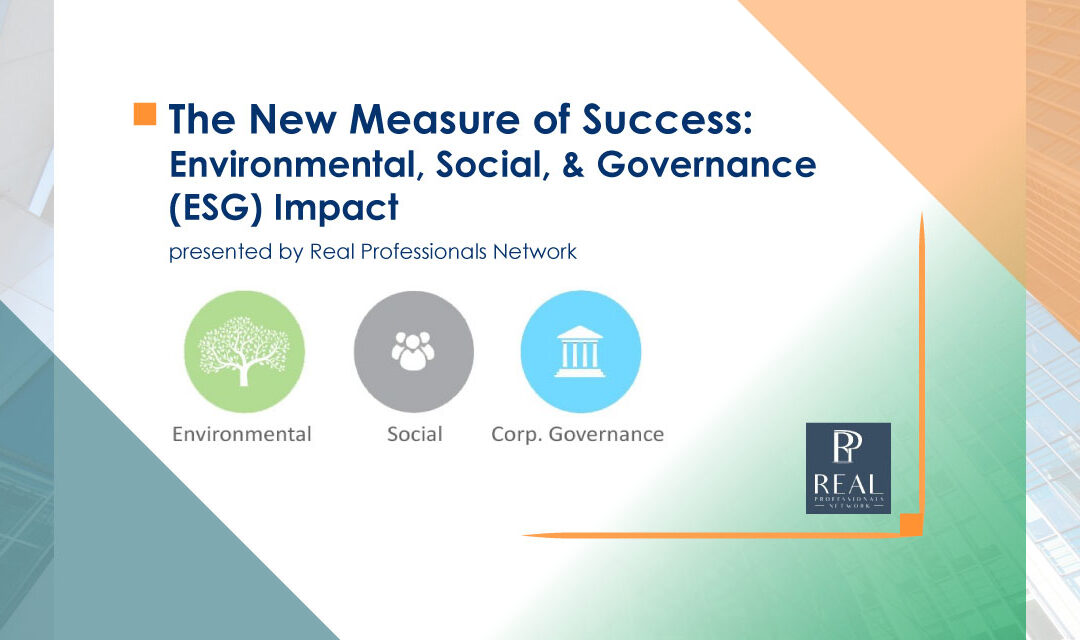
Feb 19, 2021 | Events, Homepage
Presented by Real Professionals Network
ESG (environmental, social, and governance) is a general term used in capital markets and used by investors to evaluate corporate behavior and to determine the future financial performance of companies. — Financial Times.
ESG is the new measure of success for corporations, non-profits, and countries alike.
What You’ll Learn
- Criteria
- Standards
- Implementation
- Sustainability
- Value creation
Panel
Date & Time
March 3, 2021
3:00 PM ET / 12:00 PM PT
Registration
Real Professionals Network
About Real Professionals Network
provides senior level commercial real estate and development professionals a curated industry hub where they exercise their network of relationships in a meaningful way. Our exclusive meetings help Invested Members and their guests stay top of mind, build trust and enhance credibility by sharing important senior level information. For more information visit www.realprofessionalsnetwork.com.
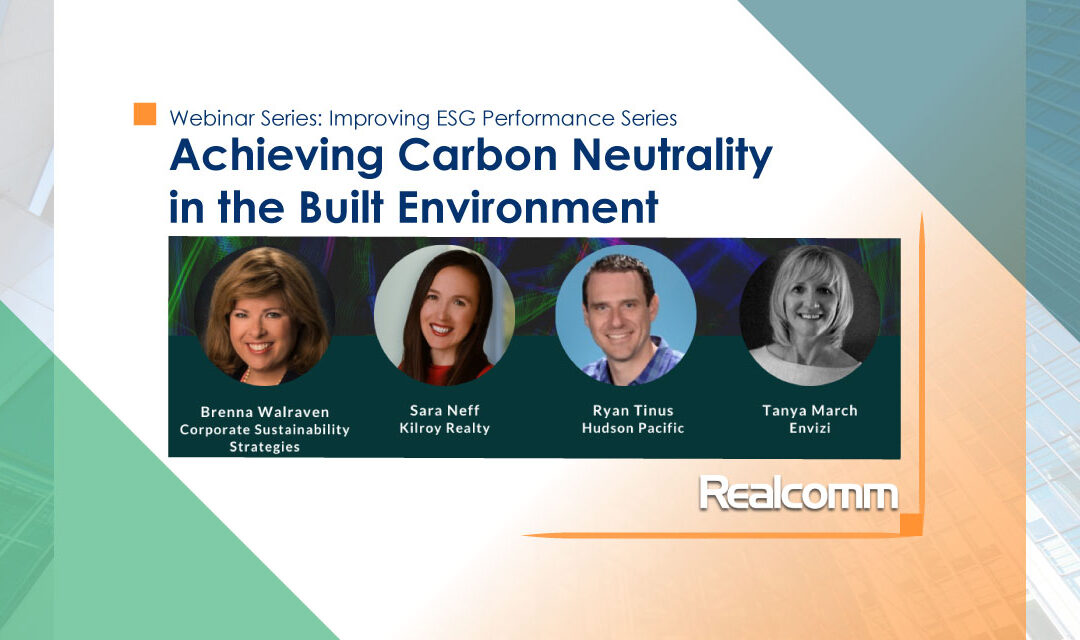
Feb 12, 2021 | Events, Homepage
The achievement of a balanced economic, social and environmental development is recognized as one of the major challenges the building industry is facing today. What is less clear is how building owners and developers can seize the opportunities offered by zero-emissions mandates and disruptive energy technologies to generate business opportunities and value for their stakeholders. In this series, industry leaders illustrate ideas and examples on how to use smart building technologies to achieve energy savings and realize the value creation potential from ESG.
Across the US, building owners and operators are tasked with making energy efficiency upgrades and/or decarbonizing their power supply to meet new emission reduction targets. This session discusses the impact of regulations on building operations and showcases portfolios that are committed to carbon neutrality.
Panelists
- Sara Neff, SVP, Sustainability, Kilroy Realty
- Ryan Tinus, Sr. Director, Engineering and Environmental Sustainability, Hudson Pacific Properties
- Tanya March, SVP, North America, Envizi
- Brenna Walraven,President and CEO, Corporate Sustainability Strategies
Date & Time
February 18, 2021
12:00 PM – 1:30 PM ET / 9:00 AM – 10:30 AM PT
Registration
Realcomm
About Realcomm
Realcomm was founded with the goal of bringing industry leaders together to discuss, demonstrate, and debate the latest innovations to impact our industry. For more information visit www.realcomm.com.
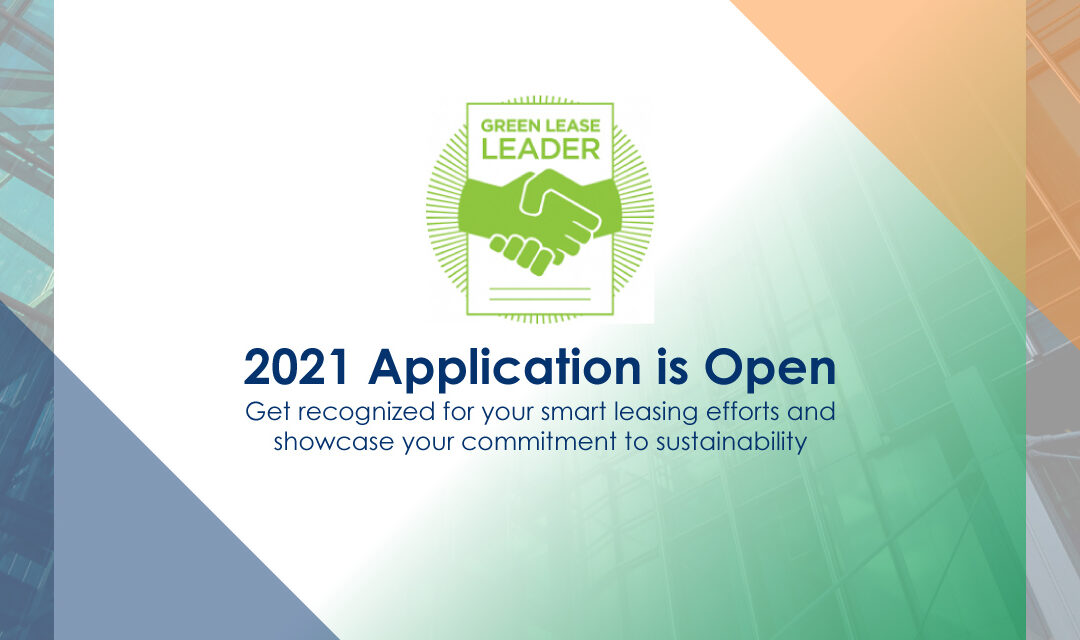
Nov 19, 2020 | Articles, Homepage
Get recognized for your smart leasing efforts and showcase your commitment to sustainability.
Building decarbonization is inevitable, and that makes green leasing more important than ever.
Green leases are a tool for improving occupant health and wellness, operating efficient and sustainable buildings, saving money, and much more. If you’re a landlord or tenant who is actively leveraging your leases to reach your ESG goals, don’t miss your chance for Green Lease Leader recognition.
Green Lease Leaders is the only national green leasing recognition program. Created by the Department of Energy’s (DOE) Better Building Alliance and the Institute for Market Transformation (IMT), it celebrates and validates leading-edge landlords, tenants, real estate teams, and governments in the commercial office, retail, and industrial sectors that are driving higher performance in leased buildings by addressing energy efficiency and sustainability through smart and green lease clauses and corporate guidelines.
Read more about the program, apply for recognition, or quickly see if you qualify by visiting greenleaseleaders.com.
About 2020 Green Lease Leaders
2020 Green Lease Leaders represented portfolios totaling more than 1 billion square feet and comprised a diverse range of buildings from large and small commercial offices to industrial buildings to data centers. Altogether, Green Lease Leaders manage nearly 3 billion square feet of commercial and government space, representing a huge potential for growth in green leases.
greenleaseleaders.com
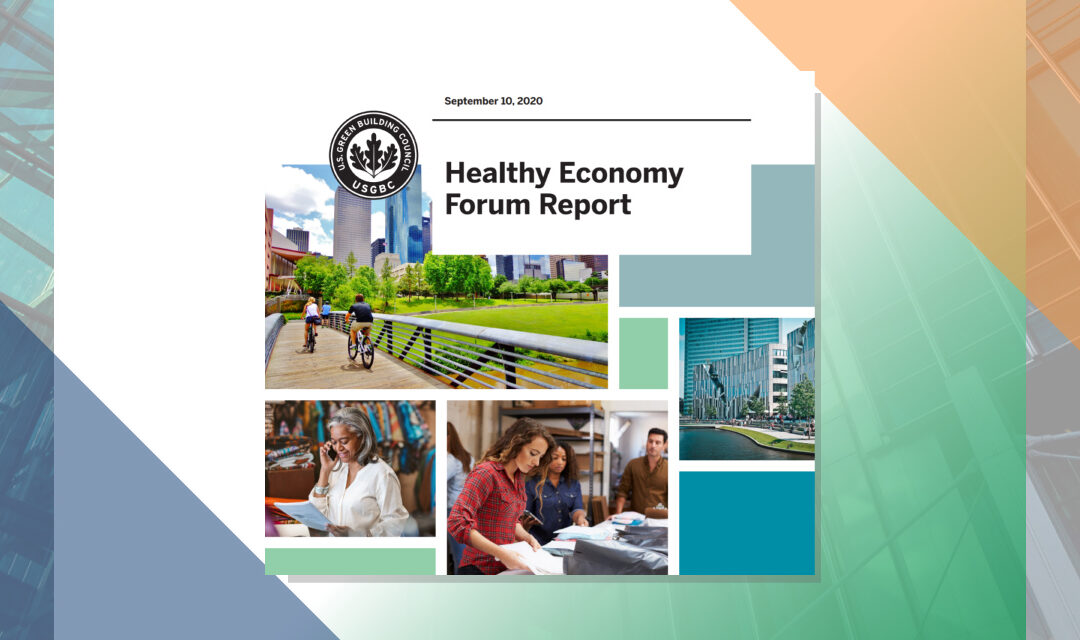
Sep 14, 2020 | Articles, Homepage
USGBC’s recently announced economic recovery strategy and vision, Healthy People in Healthy Places equals a Healthy Economy, articulates the interconnected role buildings and communities play in people’s health and the economy at large.
To make this strategy actionable, USGBC’s Healthy Economy Forum, held August 4-5, 2020, convened industry experts and frontline practitioners to provide insights and strategies for making our spaces healthier and more resilient.
At the forum, Brenna Walraven, President and CEO of Corporate Sustainability Strategies, together with Simon Turner, Owner and Founder of Building Cognition, Henry Chamberlain, President and Chief Operating Officer of BOMA International, Ben Myers, Vice President of Sustainability of Boston Properties, and Alex Spilger, Senior Vice President, Director of Sustainability of Cushman & Wakefield presented The Business Case for Healthy Buildings in a Post-COVID Era.
Notable references in the report include:
Indoor Air Quality (IAQ)
- Simon Turner, Owner and Founder of Building Cognition, noted productivity is highest when room temperature is set to 70-73 degrees and proposed building occupants will start to demand better ventilation with an increased cost of $14-$40 per person each year.
- Technology can play a key role in building trust. As Brenna Walraven, President and CEO of Corporate Sustainability Strategies, said, “There is an app for everything, and that includes indoor air quality.”
Active Design
- According to Walraven, inactivity results in $54 billion in health care costs and $14 billion in lost productivity.
Resiliency – Intersectionality
- Boston Properties’ Sustainability Program approaches this definition from an intersectional lens, combining climate action, resilience and social good, while prioritizing human health. This approach has been and continues to be shaped by watershed moments, whether it be the 2012 Superstorm Sandy to this year’s pandemic.
- Ben Myers, Vice President of Sustainability at Boston Properties, explained how they convened thought leaders and specialists to develop a plan of action for four phases of these events: retreat, return, restore and resilient. Grounded in science, their plan lays out five durable changes: physical distancing enablement, contact transmission elimination, IAQ management and expertise advancement (engineering expertise, monitoring mechanisms), cleaning and disinfection enhancement and shared responsibility and discipline for mitigation and containment (health screening, communication, testing, etc.).
Technology
- Henry Chamberlain, President and Chief Operating Officer, BOMA International, spoke about the use of sensors and cleaning, touchless or hands-free workplaces and virtual technologies as the new normal.
The Report summarizes the forum’s discussion and is the first step to a longer roadmap for the implementation of our healthy places for a healthy economy vision.
Full Healthy Economy Forum Report
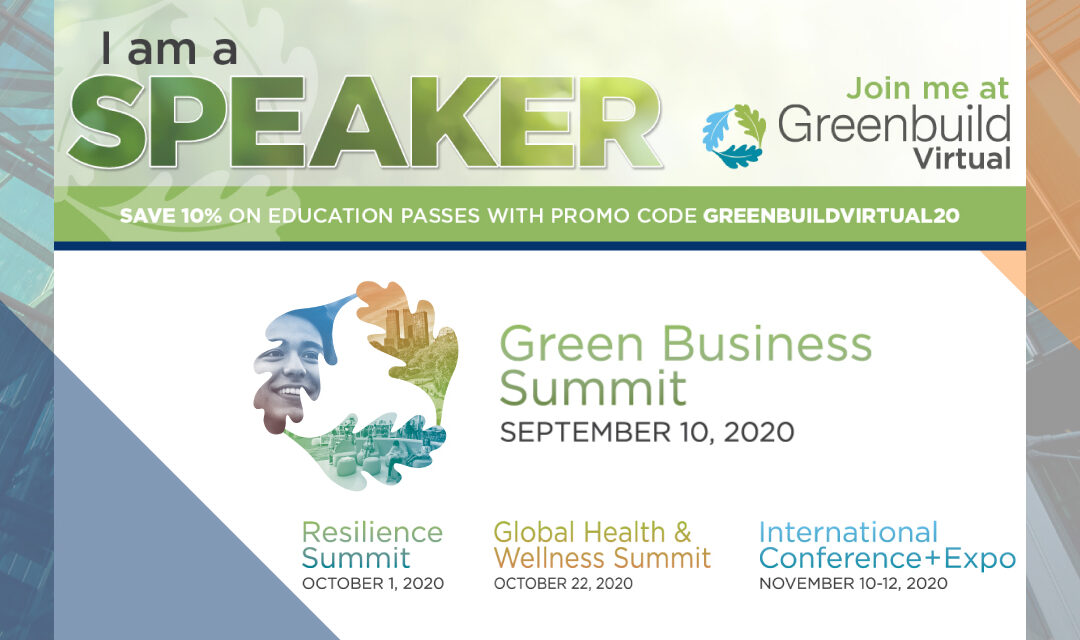
Aug 28, 2020 | Events, Homepage
presented by USGBC Green Business Summit, Greenbuild 2020
Greenbuild, the industry’s leading green building event, now offers three virtual summits in lead up to International Conference & Expo virtual event.
To kick off these expanded education offerings, the Green Business Summit will be held September 10th. At this virtual summit, thought leaders will tackle the ROI of sustainable green business, how to get buy-in and make the financial case for employee wellness programs and sustainable building as well as what commercial space looks like post COVID.
Brenna Walraven, CEO, Corporate Sustainability Strategies will lead the discussion on “Practical Approaches for Addressing Resiliency Risks.”
Green Business Summit Session: Practical Approaches for Addressing Resiliency Risks
According to the National Center for Environmental Information, the leading source of information on the impact of weather events, 2017 was the most expensive year on record for recorded insurance losses from climate-related disasters at more than $312.7 billion. Damages from floods, wildfires, landslides, hurricanes, and other natural disasters present real risks for the real estate industry. The risks are only expected to grow as real estate assets face sea-level rise, drought, heatwaves, water scarcity, and other effects of climate change. Further, changing public policy around carbon reductions are increasingly driving material market transition risks. Forward-thinking real estate practitioners are focused on understanding these risks to better identify and implement solutions for adaptation and mitigation. Investors are also increasingly demanding that climate risk factors be disclosed and appropriately managed.
In this session, attendees will hear how top real estate organizations are addressing climate risk and resilience.
Presenters will discuss how climate risks impact investment decisions, investor demands for disclosure, and strategies for adaptation and mitigation. Using a case study approach, each speaker will offer strategies that include climate risk assessments, emergency and climate change preparedness plans, moving mechanical systems, backup generators, on-site renewables and storage and other resilience options under consideration. Speakers will also cover how reporting initiatives such as GRESB and the Taskforce for Carbon Related Financial Disclosures (TCFD) are driving the need for better performance data and disclosure. After speaker presentations, the panel will utilize their real estate and sustainability expertise and experience to lead a facilitated discussion with the audience about resilience and climate risk.
Learning Objectives
- Learn about the material risks for real estate assets of climate and weather-related events as well as the impacts of public policy change and market transition risks.
- Understand how to use available resources and information to better assess the resilience of your portfolio.
- Identify property and portfolio level strategies and solutions to improve resilience and mitigate both physical and transition risks.
- Understand investor pressures for a better understanding of climate-related risks and reporting initiatives designed to increase disclosure.
Panelists
- Eric Duchon, Global Head of Sustainability, LaSalle Investment Management
- John Scott, Managing Director, REMS Florida, Colliers International
- Brenna Walraven, President and CEO, Corporate Sustainability Strategies
Q & A
After the presentation, the panel will utilize their real estate and sustainability expertise and experience to lead a facilitated discussion with the audience about resilience and climate risk.
Continuing Education (CE)
1 hour
Date & Time
September 10, 2020
10:30 AM Pacific Time
Registration & Promo Code
Green Business Summit is part of the Greenbuild Virtual educational offerings.
Use GREENBUILDVIRTUAL20 to receive a 10% discount on Greenbuild educational passes.
About Greenbuild 2020
Greenbuild 2020 is all digital. The virtual format will deliver countless opportunities to connect with Greenbuild’s leading audience of decision makers at all levels including, building owners and managers, commercial and residential contractors, architects, engineers, designers, government and municipalities, utilities and more.
Since 2002, Greenbuild has been the global stage for green building innovation and the place to learn and source cutting edge solutions to improve resilience, sustainability and quality of life in our buildings, cities and communities.
#Greenbuild 2020 includes three additional one-day summits in September and October.
Greenbuild Virtual Events
Green Business Summit: September 10
Resilience Summit: October 1
Global Health & Wellness Summit: October 22
Greenbuild Conference + Expo: November 10-12





